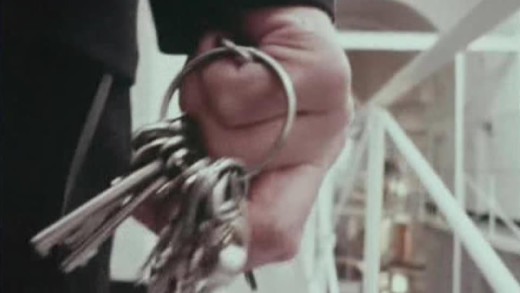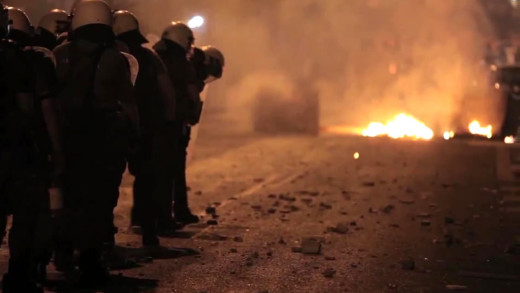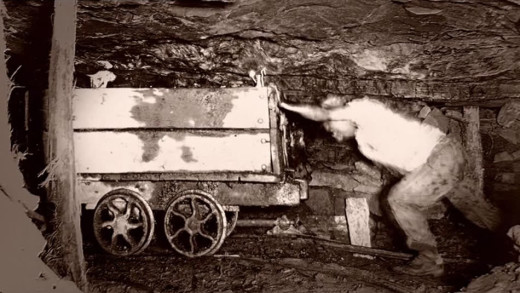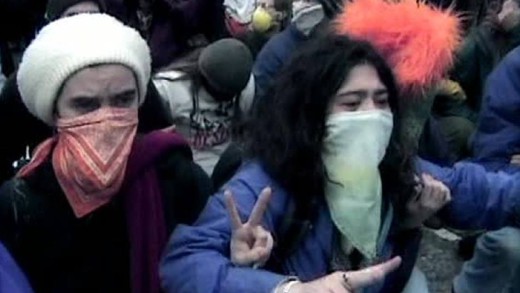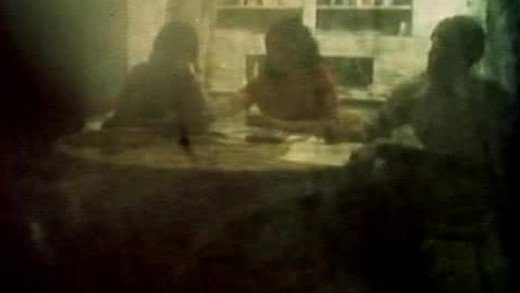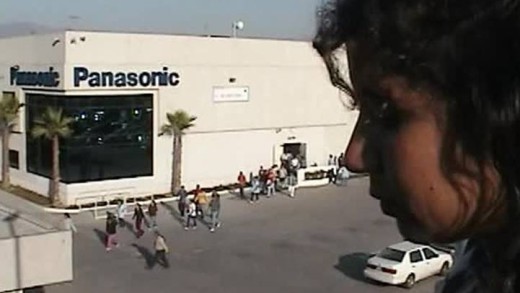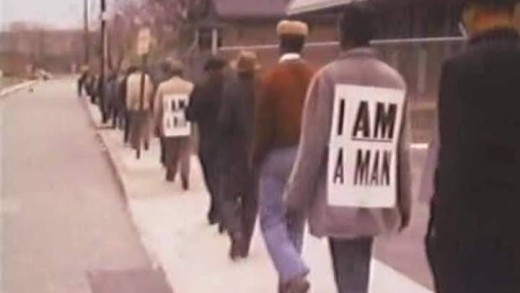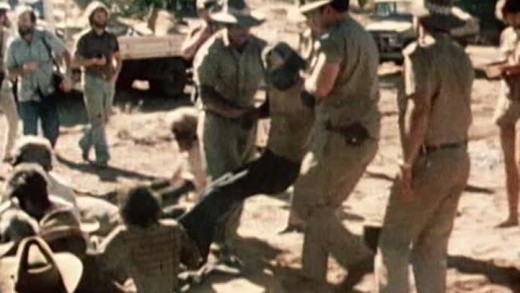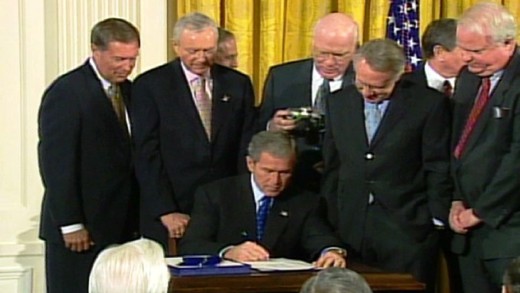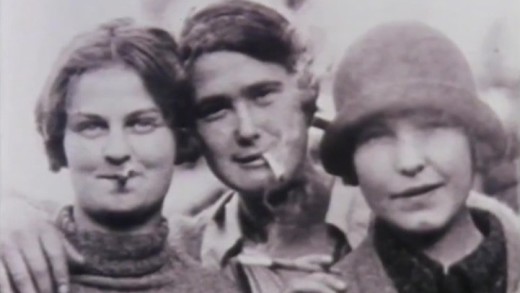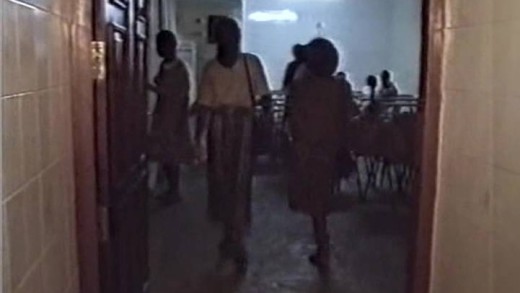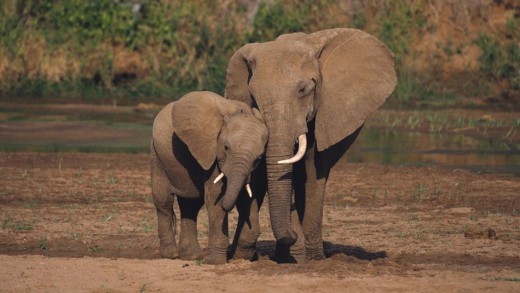Guilty Until Proven Innocent reports on the issue of innocent people confined to prisons on remand in the UK, circa 1974. People are imprisoned without trial and are later released with either a small fine, a set of mandatory conditions, or leave completely innocent. It's a strange set of circumstances in a country with such pretensions of a bill of rights and espoused 'legal protections.' Is bail a right or a privilege?
Fascism Inc. examines a series of historical events to compile a view of the past, the present and the future of fascism and its relation to the economic interests of each era—including the current era. The film travels from Mussolini's Italy, to Greece under the Nazi occupation; the civil war and the dictatorship; and from Hitler's Germany to the modern European and Greek fascism. Following on from the foundations of earlier films such as Debtocracy and Catastroika which described the causes of the debt crisis, the impact of the austerity measures, the erosion of democracy and the sell-out of the country’s assets; Fascism Inc. aspires to continue to motivate anti-fascist resistance movements across Europe, and the world.
In 1929, in the face of collapsing demand for coal and a deepening economic crisis, mine owners in the Hunter Valley of New South Wales, Australia; announced, with the support of government, that they would cut miners' wages and strip them of their workers rights. When the workers refused to agree to these terms the mine owners locked the gates. 10,000 miners, pit boys and their families now found themselves without a job. What began as an dispute about industrial labour ended up overpowering a government, crippling an industry and besieging a community. This event challenged the rights of every Australian worker, and redefined the political and industrial landscape of a country that witnessed an event forever remembered as 'The Great Australian Lockout.'
30 Frames A Second is an immersive first-person account of the events that unfolded during the week the World Trade Organisation came to Seattle in the United States, November 1999. The film is assembled from the perspective of 15-year veteran network-news cameraman Rustin Thompson, who became disillusioned with mainstream media and hence covered the WTO as an independent journalist. As such, even with press credentials for the event, Thompson is swept into the retribution of the state and police power which hit at the protests with tear gas, pepper spray, and police abuse. For him and the protesters alike, it begs the question about the functioning of the so-called democracies we live in, where civil liberties and human rights are curtailed in favour of facilitating the vast corporatocracy and global economic empire—precisely one of the points that sparked protests in the first place...
Underground is a film about the Weather Underground Organisation—a group founded as a militant faction of the civil rights and anti-war movement of the 1960s and 1970s. The film combines interviews with members of the group after they went underground who explain how they became radicalised amongst the political happenings in the United States at the time, as well as the revolutionary struggles in Cuba, Russia and China, and the history of struggles over Native American rights and labour issues. Also detailed is the group's analysis of American society, addressing those who have inspired them, and further explaining the reasons behind their militancy, while also introducing the issue of tactics. We see the use of property destruction as a way to bring about change and destabilise the current political order. Underground takes an intimate look at the inner workings of the Weather Underground and their strong internal collective identity, providing a record of how a bunch of middle-class Americans became self-styled militant revolutionaries, raising questions not only about the merits of their struggle, but also about past and future radical actions.
In Mexico, 'maquiladoras' is a word used to describe the sort of factories that have become commonplace with globalisation—mass assembly and manufacturing plants primarily staffed by women for low wage and long hours in unsafe and toxic conditions. Tijuana has attracted so many such factories that it has gained the nickname Maquilapolis. Delving into the landscape of this, this film asks the question: What is the human price of globalisation? Maquilapolis brings American and Mexican-American filmmakers together with Tijuana factory workers and community organisers to answer that question and tell the story of globalisation through the eyes and voices of the workers themselves. The result is a film to inform and inspire, as each day the workers confront labor violations, environmental devastation and urban chaos...
Atomic Footprints uses archival footage and new material from the outback of Australia to examine the nuclear fuel chain, and the current push to expand uranium mines throughout Australia. This film speaks with local indigenous communities about the impact of already-existing uranium mining and refinement, and shows in clear examples some of the reasons why we should continue to oppose it around the world.
The Tall Man is the story of an Aboriginal man, Cameron Doomadgee (tribal name: Mulrunji) who in 2004 was arrested by Senior Sergeant Chris Hurley (the so-called 'Tall Man') in Palm Island, a tropical paradise in Australia's Far North. 45 minutes after the arrest, Mulrunji was found dead in the Palm Island police station. His injuries were like those of someone who'd been in a fatal car crash. The police claimed he had "tripped on a step," but the community knew this was bullshit. The Palm Islanders protested for truth and burnt down the police station. The subsequent trial of Hurley—who had been decorated for his work in Aboriginal communities—made headlines day after day, shadowed by Queensland police threatening to strike. The police officer was acquitted for the death by the Attorney General. The Tall Man follows these stories by delving into the courtroom, the notorious Queensland police force, and speaking with the Indigenous community of Palm Island, where this tale is sadly still indicative of many of the continuing atrocities of Aboriginal deaths in police custody.
Spring of 1968 in Memphis Tennessee marked the peak of the Civil Rights movement in the United States. At the River I Stand sets out to reconstruct the eventful months leading up to this period by looking at what started as a strike by sanitation workers which quickly soared into a national conflagration. The film disentangles the complex historical forces that came together for the struggle as well the inevitability of tragedy at the death of many, including Martin Luther King. At the River I Stand brings into sharp relief issues that have only become more urgent in the intervening years: the connection between economic and civil rights; debates over strategies for change, and the questions of effectiveness of pacifist tactics for social change; the demand for full inclusion of African Americans in life; as well as the pressing fight for dignity for all working people...
On 1 May 1946, under occupation and wage slavery by the white man, 800 Aboriginal workers walked off sheep stations in the north-west of Western Australia, marking the beginning of a carefully organised strike that was to last for at least three years, and never officially ended. The strike was a demand for basic freedoms and for better wages considering the imposed conditions. A fight that sadly continues to this day, speaking to the truth of a country still occupied and brutally colonised, land that was never ceded.
A few weeks after the September 11 attacks in 2001, the United States congress quickly passed the USA PATRIOT Act--a complicated and controversial law which was purportedly required to help with tracking future terrorist threats. Unconstitutional sets out to explain this law and examine its true impact. Citing a trove of examples from people whose lives have been directly effected, what we see is how law enforcement has rounded up Muslims and people with Arabic names to detain them for wild unspecified lengths of time without due process or even charges; the massive curtailment of civil liberties; erosion of enshrined privacy rights, increases in surveillance; and the abuses of Guantanamo Bay and Abu Ghraib.
Made over five years, with contributions from hundreds of women and over 200 Australian films, For Love or Money is a pictorial account of women's history in Australia over the past decades. The film chronicles the cycles of women's gains and losses as they are moved in and out of the workforce according to demands of the age, revealing how women's unpaid and voluntary work over the years has kept and continues to keep an entire system running smoothly, both in peacetime and in war. In this culture, women do the work that is never paid or still not even recognised as real work. This film shows how this system determines the kinds of jobs women do in the paid workforce--the low-paid, low-status jobs--and how women have fought and organised for equality and wage justice for over a century. For Love or Money remains relevant today as women continue the unfinished campaigns for equal pay, maternity leave and childcare, and still carry the major responsibility for caring and nurturing in the culture of individualism.
Globalisation has gone to great lengths to coerce many countries around the world to open 'free trade zones' for Western markets, where businesses receive special tax benefits and other rewards for operating factories and exploiting cheap labour. The argument, as is always cited, is for growth of the global economy. Free Trade Slaves sets out to examine these ideas by looking at the realities of such practice. Told from the perspective of the workers in Sri Lanka, El Salvador, Mexico and Morocco; the film exposes systemic human rights abuses, harrowing environmental destruction, birth defects and other long lasting health problems and social issues. The filmmakers suggest that workers around the world need to assert the right to unionise and organise together to demand and retain decent conditions, and that consumers should do their part by boycotting companies that continue to abuse people and the environment.
By taking the example of documenting the conditions in zoos and circus shows, An Apology to Elephants is a film about the institutional cruelty to animals and their environments. In the circus, elephants are whipped, beaten and struck with hooks—a pain-compliance technique called bull-hooking—to perform tricks and behave according to the requirements of captivity. The film also looks at the prevalence of the ivory trade, stating that the current elephant killing rate would lead to extinction of the species in ten years. The film is a call to more than an apology, it's a call to stop these sadistic institutions and repair the damage done to animals and the environment by this culture.
